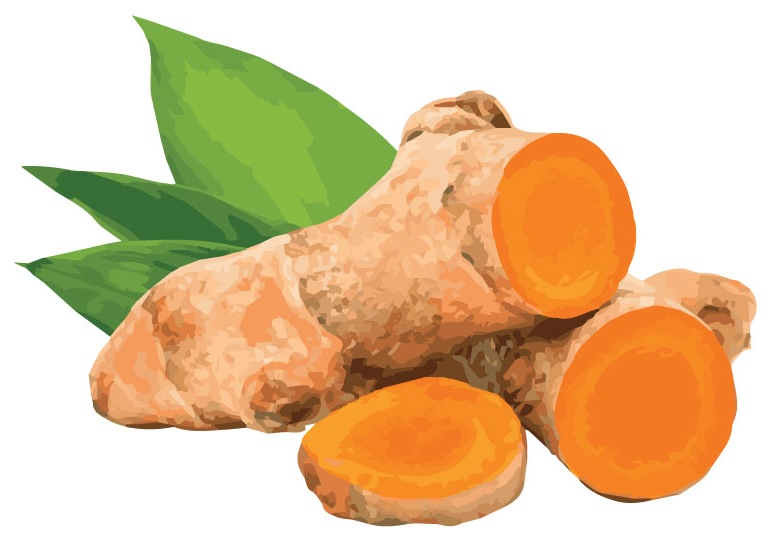Research on the effects of turmeric in honey on our immune system
Turmeric (Curcuma longa L.)
The golden spice of life
has been used as a healing and household remedy for over 5000 years.
In the traditional medicine of India and China, turmeric has been considered a versatile healing and home remedy for more than 5000 years. It has been traditionally used for many diseases such as Lekhanīya (gallstone, hypolipidemia) Dīpana (hypothyroidism) Prameha (diabetes) Pāṇḍughna (anemia) Raktaśodhana (all inflammatory diseases, eg. gastric ulcer,inflammatory bowel disease, arthritis, pancreatitis, allergy, cancer,) Jvaraghna (fever) Viṣaghna (malaria, leishmaniasis, antihelminthic) Kuṣṭhagna (psoriasis) Kaṇḍūghna (itching) Vedanāstahāpana (pain) Sandhānīya (bone fractures osteoporosis) Śirovirecana (multiple sclerosis, Epilepsy, Alzheimer's, Parkinson's) Stanyaśodhaka (lactation cleanses breast and breast milk) [1] [2]poisoning and wound healing[3] [4] used.
Turmeric is also recognized by the EU as a traditional herbal medicine for use in digestive disorders and mild hepatobiliary complaints[5].
Traditional herbal medicine for digestive disorders.
Curcumin, the main ingredient in turmeric, has vasoprotective[6],blood-thinning and digestive effects [7].It detoxifies, eliminates heavy metals from the body, inhibits bone loss, lowers cholesterol, and has beneficial effects on diabetes and Alzheimer's disease [8].
Research proves that turmeric prevents cancer
Turmeric prevents skin and colon cancer and prevents the growth of tumor cells.[5] In traditional Indian medicine, turmeric is especially recommended for uterine and breast cancer [9].
Several studies investigating the effect of turmeric extracts in osteoarthritis, knee osteoarthritis, and rheumatoid arthritis concluded that they were equally effective or more effective compared with drugs. Patients experienced less pain [10].
Turmeric may alter the effects of drugs and chemotherapy. If you have narrowed bile ducts, gallstones, acute liver or biliary inflammation, or are taking blood-thinning medications, turmeric should only be consumed after consulting a physician..[11]
"Turmeric is chemically diverse: approximately 235 compounds have been identified to date Turmeric is as effective or even more effective than isolated curcumin products"[1]
[1] Dr. Chakrapany Sharma*, Dr. Ravindra Kumar, Dr. Ashutosh Sharma, Dr. Dharmendra Sharma and Dr. T. Madhuri TURMERIC (CURCUMA LONGA) WSR TO CURCUMIN, 2017, WJPR Volume 6, Issue 7, 740-753
[wjpr]
[2] Thakur R, Puri HS, Husain A. Major medicinal plants of India. Central Institute of Medicinal and Aromatic Plants; Lucknow: 1989.
[worldcat]
[3] Singh A, Singh AK, Narayan G, Singh TB, Shukla VK. Effect of Neem oil and Haridra on non-healing wounds. Ayu. 2014;35(4):398-403. doi:10.4103/0974-8520.158998
PMC
[4] Biswas TK, Mukherjee B. Plant medicines of Indian origin for wound healing activity: a review. Int J Low Extrem Wounds. 2003 Mar;2(1):25-39. doi: 10.1177/1534734603002001006. PMID: 15866825.
PUB MED
[5] Kurkuma – traditionelles Pflanzliches Arzneimittel in der EU
arzneipflanzenlexikon
[6] Akazawa, N., Choi, Y., Miyaki, A., Tanabe, Y., Sugawara, J., Ajisaka, R., & Maeda, S. (2012). Curcumin ingestion and exercise training improve vascular endothelial function in postmenopausal women. Nutrition research, 32(10), 795-799.
[Science Direct]
[7] Bundy R, Walker A. F, Middleton R. W, Booth J. Turmeric extract may improve irritable bowel syndrome symptomology in otherwise healthy adults: A pilot study. J Altern Complement Med. 2004;10:1015–8.
[Europe PMC]
[8] Prof. Dr. Sigrun Chrubasik-Hausmann, Kurkuma
uniklinik-freiburg
[9] Rathaur P., Raja W., Ramteke P.W., John S.A.: Turmeric: The Golden Spice of Life. Int J Pharm Sci Res, 2012; Vol. 3(7): 1987-1994
[ResearchGate]
[10] Bachmann C: Curcuma bei Arthrose und rheumatoider Arthritis: Klinische Studien dokumentieren die Wirksamkeit von Gelbwurz-Extrakten. Schweiz Z Ganzheitsmed 2016;28:321-323.
[Karger]
[11] Kurkuma kann die Wirkung von Medikamenten und Chemotherapie verändern
arzneipflanzenlexikon

 Deutsch
Deutsch 